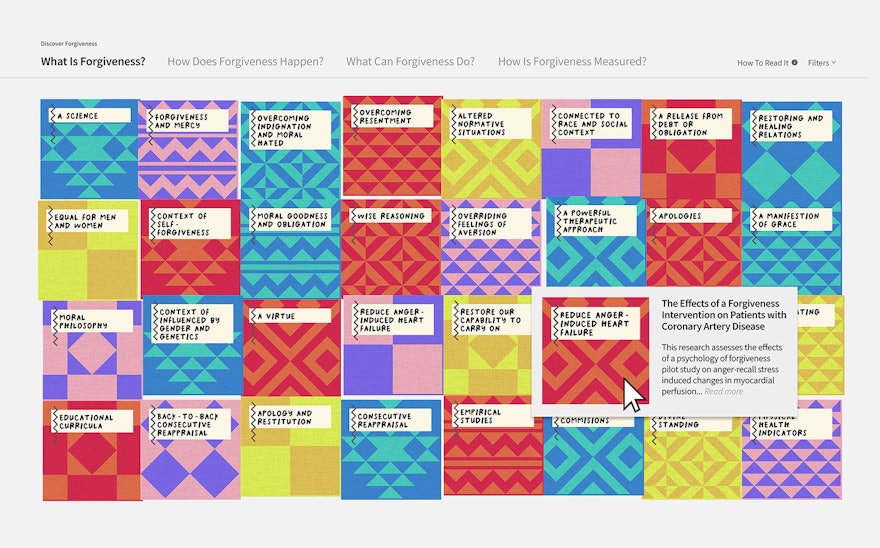The act of forgiveness is one of the most powerful gestures we can extend to others and to ourselves. Along with resolving conflict and improving our interpersonal relationships, it can make a significant positive impact on our mental health and physical well-being. Discover Forgiveness is a new initiative of the Templeton World Charity Foundation and the John Templeton Foundation that seeks to make the growing body of research into the science of forgiveness more accessible. Pentagram partner Giorgia Lupi and team have created a dynamic digital experience that curates this first-ever collection of groundbreaking research in a vibrant interactive visualization.
Pentagram worked closely with TWCF to conceptualize the collection, from helping to design the datasets to developing a format that would communicate with a wider audience. The foundation supports academic research and tool development for forgiveness studies and the platform is part of a global campaign to advance the understanding of forgiveness research and equip people with the tools they need to deploy forgiveness in their own lives and communities. The database brings together various research papers in one place for the first time and is intended to be used by front-line forgiveness workers like educators, mental health therapists, clergy and policymakers, as well as academic researchers and scientists specializing in the subject.
A goal of the project was to visualize the disparate body of research from contributors from around the world and create an online library that was easy to search and use. The design is based on the creative metaphor of a colorful quilt—a symbol of comfort, as well as the collaborative nature of the interdisciplinary archive, which weaves together different strands of research in a single place. This also ties into TWCF's larger mission and the message of threading forgiveness into the fabric of your life.
The Pentagram team worked with TWCF to strategize and develop data sets that would provide an organizational framework for the collection. They also helped source content for the collection, working with a panel of experts, researchers and institutions who suggested articles and papers for the database and offered feedback on ways to structure the data sets. These center on qualitative data; forgiveness science is an emerging field and its measures are still evolving. The site sorts the papers according to four general themes, which are structured as helpful, easy-to-understand questions: What is forgiveness? How does forgiveness happen? What can forgiveness do? And how is forgiveness measured?
Each research paper is represented by a piece of “fabric” in the quilt that offers a data portrait of its theme and geographic focus. The themes (education, religion, family, etc.) are color-coded, while geometric patterns indicate the geographic regions where it originated (Africa, Europe, Latin America, etc.) These colors and graphic motifs may be combined if the papers cover multiple criteria, and are described in an accompanying legend.
The visualization dynamically sorts the pieces as the search filters are changed. The resulting swatches are deliberately misaligned in spots as they come together, to make them more like a patchwork. Handwritten tags on each patch sum up the titles and lend the site a warm, human quality. Rollovers offer a brief pop-up summary of each piece; clicking into it leads to a more detailed description, along with a link to the original paper. (These are tagged as “Open Access” if they are available to readers free of charge.) The collection is stored in a cloud-based Airtable database that TWCF can easily update and change as needed.

